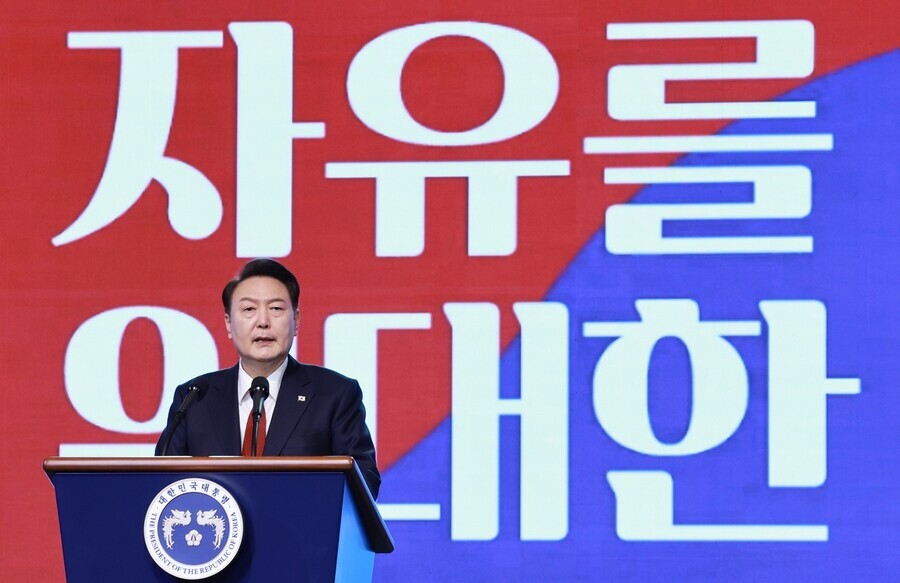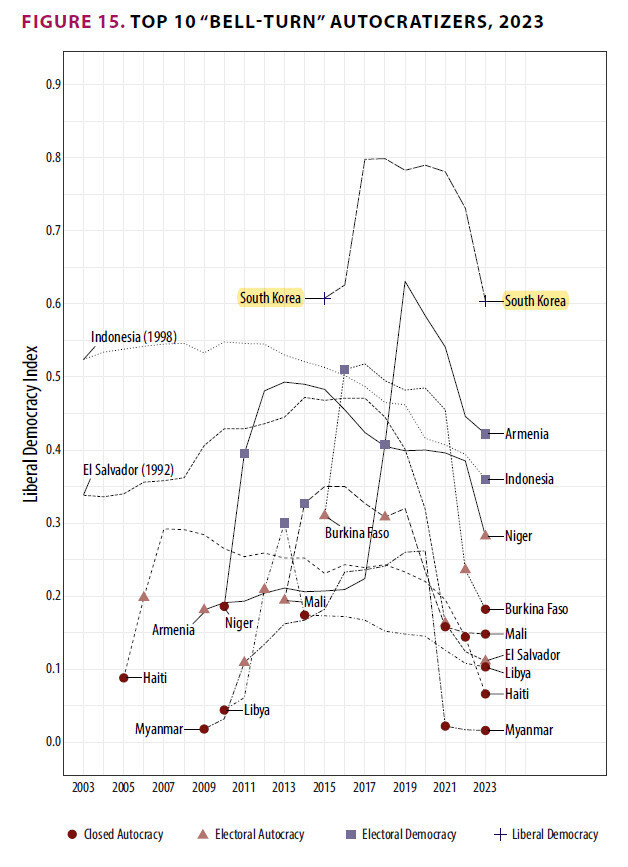hankyoreh
Links to other country sites 다른 나라 사이트 링크
South Korea’s democratic processes eroding, international think tank says

Democracy in South Korea has been abruptly regressing since the inauguration of the Yoon Suk-yeol administration, according to an international think tank.
The Varieties of Democracy (V-Dem) Institute at the University of Gothenburg released its Democracy Report 2024 on Thursday, which stated that while South Korea had been making advances in democratization processes in the last few years, it has recently regressed on a “downward slope.”
The report states that South Korea ranked 47th among 179 countries by scoring 0.6 on the Liberal Democracy Index (LDI), which assesses the rule of law, checks and balances, and civil liberties.
This demonstrates a huge downward slope in both scores and rankings, as South Korea had previously scored 0.78 (18th) in 2019, 0.79 (17th) in 2020-2021, and 0.73 (28th) in 2022.
Countries that receive scores close to 0 are classified as “closed autocracies,” while those that have scores close to 1 are dubbed “liberal democracies.”
More than 4,200 experts from around the world contribute to the publication of the V-Dem Institute’s annual Democracy Report. They base their assessments on elections, participatory processes, deliberation, and equality by collecting data on electoral fairness, civil and media freedoms, judicial independence, gender equality, and more.
The institution views pronounced decreases in LDI levels as marks of increases in autocratization, and South Korea has joined 41 other countries to be labeled as such.
The report stated, “South Korea – a country that was featured as a rare case of democracies that are bouncing back in last year’s ‘Democracy Report’ – has recently reversed back to its pre-democratization episode levels.”

V-Dem asserted that South Korea’s democracy bounced back after the inauguration of former human rights activist Moon Jae-in as president after former President Park Geun-hye’s corruption scandal, which led to large-scale protests. However, it pointed out that “right-wing and conservative” President Yoon Suk-yeol’s rise to power has virtually neutralized the efforts made by Moon.
The report went on to assess, “President Yoon Suk-yeol’s coercive measures to punish members of the former Moon administration, along with attacks on gender equality, set South Korea to decrease its LDI levels.”
The evidence lies in the fact that the Yoon administration has been mobilizing the police, prosecutors, and auditors in its attacks and criticisms of the former administration and its policies, as well as in its attempts to penalize former government officials.
Yoon’s abolition of the Ministry of Gender Equality has also been defined as an attack on gender equality.
The institution also commented on declining freedom of expression and freedom of the press, demonstrated by state censorship efforts, self-censorship by media outlets, and the harassment of journalists – all of which have contributed to the downward spiral.
Other regions also classified as undergoing episodes of autocratization include Hong Kong, Poland, and Hungary.
Out of the 32 countries categorized as liberal democracies, only South Korea was categorized as going through an autocratization episode.
The number of countries going through autocratization episodes nearly quadrupled in the past 20 years, from 11 in 2003 to 42 in 2023, showing that the decline of democracy is a global phenomenon.
By Park Kang-su, staff reporter
Please direct questions or comments to [english@hani.co.kr]

Editorial・opinion
![[Editorial] Perilous stakes of Trump’s rhetoric around US troop pullout from Korea [Editorial] Perilous stakes of Trump’s rhetoric around US troop pullout from Korea](https://flexible.img.hani.co.kr/flexible/normal/500/300/imgdb/original/2024/0509/221715238827911.jpg) [Editorial] Perilous stakes of Trump’s rhetoric around US troop pullout from Korea
[Editorial] Perilous stakes of Trump’s rhetoric around US troop pullout from Korea![[Guest essay] Preventing Korean Peninsula from becoming front line of new cold war [Guest essay] Preventing Korean Peninsula from becoming front line of new cold war](https://flexible.img.hani.co.kr/flexible/normal/500/300/imgdb/original/2024/0507/7217150679227807.jpg) [Guest essay] Preventing Korean Peninsula from becoming front line of new cold war
[Guest essay] Preventing Korean Peninsula from becoming front line of new cold war- [Column] The state is back — but is it in business?
- [Column] Life on our Trisolaris
- [Editorial] Penalties for airing allegations against Korea’s first lady endanger free press
- [Editorial] Yoon must halt procurement of SM-3 interceptor missiles
- [Guest essay] Maybe Korea’s rapid population decline is an opportunity, not a crisis
- [Column] Can Yoon steer diplomacy with Russia, China back on track?
- [Column] Season 2 of special prosecutor probe may be coming to Korea soon
- [Column] Park Geun-hye déjà vu in Yoon Suk-yeol
Most viewed articles
- 1[Editorial] Perilous stakes of Trump’s rhetoric around US troop pullout from Korea
- 2Nuclear South Korea? The hidden implication of hints at US troop withdrawal
- 3Behind-the-times gender change regulations leave trans Koreans in the lurch
- 4‘Free Palestine!’: Anti-war protest wave comes to Korean campuses
- 5[Photo] ‘End the genocide in Gaza’: Students in Korea join global anti-war protest wave
- 6In Yoon’s Korea, a government ‘of, by and for prosecutors,’ says civic group
- 7Korean president’s jailed mother-in-law approved for parole
- 8[Guest essay] Preventing Korean Peninsula from becoming front line of new cold war
- 9AI is catching up with humans at a ‘shocking’ rate
- 10Dermatology, plastic surgery drove record medical tourism to Korea in 2023